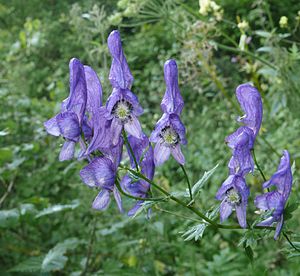Note: This is a project under development. The articles on this wiki are just being initiated and broadly incomplete. You can Help creating new pages.
Difference between revisions of "Aconitum heterophyllum - Ativisa, Indian Atees"
m (HPNadig moved page Ativisa (Aconitum heterophyllum) to Aconitum heterophyllum - Ativisha, Ativisa) |
m (Prabhakar moved page Aconitum heterophyllum - Ativisha, Ativisa to Aconitum heterophyllum - Ativisa, Indian Atees) |
(No difference)
| |
Revision as of 16:55, 5 April 2018
Aconitum [1] , also known as aconite, monkshood, wolf's bane, leopard's bane, mousebane, women's bane, devil's helmet, Queen of all Poisons, or blue rocket, is a genus of over 250 species of flowering plants belonging to the family Ranunculaceae. These herbaceous perennial plants are chiefly native to the mountainous parts of the northern hemisphere, growing in the moisture-retentive but well-draining soils of mountain meadows. Most species are extremely poisonous and must be dealt with carefully.
Medicinal use
Aconite has long been used in traditional Chinese medicine and Ayurveda (Hindu traditional medicine). Aconite was also described in Greek and Roman medicine by Theophrastus, Dioscorides, and Pliny the Elder, who most likely prescribed the Alpine species Aconitum lycoctonum.
Common name
- English - Indian Atees
- Kannada - ಅತಿವಿಷ
- Hindi - Atis
